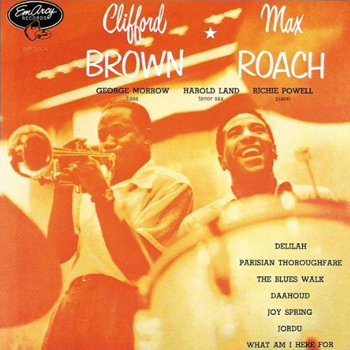 There was a point, while I was at New England, where I became aware that I was playing the same clichés that all sax players play, all the time. This became really obvious as tempos increased. Think about the last time you played an up-tempo bebop tune. Did you find yourself playing a great deal of vocabulary that had been “rehearsed”? I often do – especially on the less familiar tunes. Even worse for me, these lines are some of the most common “sax licks” out there…no, not the David Baker bebop lick…but I sure play a lot of ascending arpeggios…
There was a point, while I was at New England, where I became aware that I was playing the same clichés that all sax players play, all the time. This became really obvious as tempos increased. Think about the last time you played an up-tempo bebop tune. Did you find yourself playing a great deal of vocabulary that had been “rehearsed”? I often do – especially on the less familiar tunes. Even worse for me, these lines are some of the most common “sax licks” out there…no, not the David Baker bebop lick…but I sure play a lot of ascending arpeggios…
Well, there are a lot of paths to break out of this sort of thing, but one of the more useful ones for me, has been transcribing the solos of non-sax players. In particular, I love guitarists and trumpet players, but a great solo is a great solo.
Around a year ago, a student of mine was slaving away at Clifford Brown’s “Joy Spring” (from Clifford Brown & Max Roach). That’s a real masterpiece of his, and the student was struggling with the infamous (and incredibly cool) 1st-chorus bridge. While helping overcome some of that, I remembered my excitement for this particular solo when I first heard it. Its filled with perfect bebop phrases with less of the common idiomatic lines associated with Charlie Parker’s enormous shadow. In short, Clifford’s solo reminded me that bebop could be played without quoting Bird every other bar.
So in honor of Brownie, and the efforts of that particular student, here’s my completed take on “Joy Spring”.
Clifford Brown’s solo on “Joy Spring” (revised 3/9/11)
Afterthoughts
I had a conversation with some local pros, and being a shameless self promoter :), I mentioned these transcriptions. In particular, since I was talking to some trumpet players at the time, I thought they’d get a kick out of a sax-player picking one of the great trumpet players. I was wrong. Bluntly, I was told by two of them that Brownie had already been completely transcribed and archived. It was even suggested that I shouldn’t bother, and go do someone else’s solos. Clearly, they misunderstood my intentions.
Transcribing is about absorbing the ideas and influence of players you find appealing. Despite me writing these down when I’m finished, this is about the process, not the resulting sheet music.
Here’s my process in a nutshell:
- I pick 16 to 32 bars a day. Sometimes less if its really nasty…not usually much more though.
- Once I have that memorized, I play it a ton, looking for phrasing I might have missed, quirks in articulation and cool lines to blatantly steal.
- After that, I write it down. This is really for posterity sake. I like to refer back to old solos I worked on. Often, I look back to find that interesting lick I didn’t really get at the time or remember a sequence that was developed really well.
- Day 2? The next 16 to 32 bars…rinse, repeat…


Hey Adam,
Thanks for sharing your process of transcription with everyone. Seems like you really master each part that way.
Seems silly that the ‘local pros’ don’t think it’s worth the effort to transcribe something that’s already been done.
Transcribing’s main benefit is to the person who actually puts in the time. It’s like many things in that sense. Just because a math or physics problem has been solved, doesn’t mean it won’t help a student in understanding the subject.
I feel it’s the same way with music.
-Neal
I agree. Its a matter of the labor of love. I need to absorb the info to use it. The only way that happens is when I dig in myself.
I used to play out of Brecker transcription book daily, which helped, but the minute I picked my 1st Brecker solo, I felt the lines start to click. It took the extra effort, that extra layer to get payoff.
Hello fellow Jazzer! Great Transcription! I have seen many versions and this is by far my favorite. The only concern I have is like the last 8 measures it seems like the ghosted notes really mess with everyone’s ears! Don’t you think some of the notes on the final measures have grace notes/bends into some of the notes? Regardless, thanks for sharing your great information! Please keep up the good work!
Thanks for coming by Faris!
There’s probably a few subtle nuances…and my knowledge of trumpet is kind of sketchy…so I’m sure there’s more to be added. Feel free to make a suggestion. I’d be happy to do an update if its warranted.
After review, I think you’re right…and it does seem to be the crazy rhythms that make everything so distracting. I’ve edited it to include a couple things I hear as scoops, and added about 4 new grace notes.
Adam, I’d love to edit this myself for guitar. If you used Sibelius software to transcribe it, could you send me the actual Sibelius file? Good work!
Thanks,
Gordon
God, Allah or whoever is Kingpin out there – protect me from “local Pros”
I like your transcription